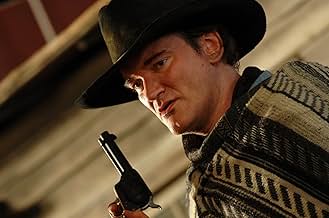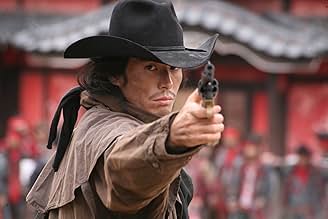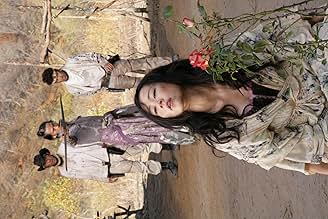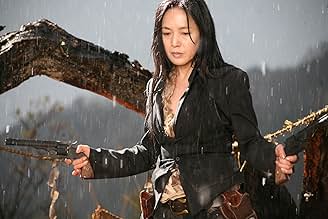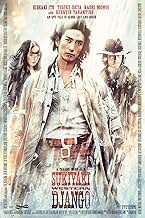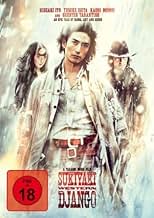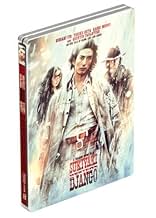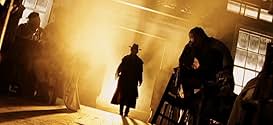AVALIAÇÃO DA IMDb
6,1/10
16 mil
SUA AVALIAÇÃO
Adicionar um enredo no seu idiomaA nameless gunfighter arrives in a town ripped apart by rival gangs and, though courted by both to join, chooses his own path.A nameless gunfighter arrives in a town ripped apart by rival gangs and, though courted by both to join, chooses his own path.A nameless gunfighter arrives in a town ripped apart by rival gangs and, though courted by both to join, chooses his own path.
- Direção
- Roteiristas
- Artistas
- Prêmios
- 4 vitórias e 5 indicações no total
- Direção
- Roteiristas
- Elenco e equipe completos
- Produção, bilheteria e muito mais no IMDbPro
Avaliações em destaque
The line between Japanese samurai films and Italian Westerns (called "spaghetti" in the West and "macaroni" in the East) has been blurry from the days of Akira Kurosawa and Sergio Leone. The widescreen expanses of 19th Century lawlessness was a cinematic language easily translated between chambara and Euro oaters.
Prolific filmmaker Takashi Miike forgoes the pasta and dubs his dabbling in the horse opera a "sukiyaki" western. This Japanese stew-like metaphor is appropriate as Miike throws in a great number of influences and references into his dish. What cooks up may bear the name "Django" (and he introduces a coffin hiding a machine gun midway through the film) but it owes more to Kurosawa than Corbucci in its acknowledged inspiration from YOJIMBO. The unnamed black clad antihero rides into a previously thriving town to find it a wretched hive of scum and villainy; occupied by a handful of citizens and two warring clans, the Genji and Heike.
Clad in red and white, Miike injects some heavy duty rose overtones into the film, calling out the War of the Roses, Henry VI, and a hybrid rose bush named "love" quite frequently. At least two of the film's characters are products of Genji (red) and Heike (white) love affairs.
Even with a wealth of past ideas to pilfer, SUKIYAKI WESTERN DJANGO can't sustain itself for its full two hour running time. Things slow down about an hour into the proceedings. In order to inject some life into the faltering action, Miike breaks into the cartoon sound effects library and attempts to make SWD a life action anime film. These instances feel completely out of place, even after the highly stylized pre-credit sequence starring living cartoon character Quentin Tarantino.
It's strange with actors speaking English as a second language (for the most part) and who muddle through some tricky pronunciations (thank goodness for the English subtitles) that the worst performance of the film comes courtesy of a native English speaker. Quentin Tarantino seems to be doing some kind of Western drawl crossed with a fluctuating German accept as if channeling a drunk Klaus Kinski through a faulty connection. Tarantino's embarrassing "acting" may be brief but every second he spends on screen is excruciating.
Sure to be a hit with every hipster who has never seen an Asian in a cowboy hat (allow me to recommend TEARS OF THE BLACK TIGER and THE NEW MORNING OF BILLY THE KID), SUKIYAKI WESTERN DJANGO could do with some tightening up and a complete Tarantino-echtomy.
Prolific filmmaker Takashi Miike forgoes the pasta and dubs his dabbling in the horse opera a "sukiyaki" western. This Japanese stew-like metaphor is appropriate as Miike throws in a great number of influences and references into his dish. What cooks up may bear the name "Django" (and he introduces a coffin hiding a machine gun midway through the film) but it owes more to Kurosawa than Corbucci in its acknowledged inspiration from YOJIMBO. The unnamed black clad antihero rides into a previously thriving town to find it a wretched hive of scum and villainy; occupied by a handful of citizens and two warring clans, the Genji and Heike.
Clad in red and white, Miike injects some heavy duty rose overtones into the film, calling out the War of the Roses, Henry VI, and a hybrid rose bush named "love" quite frequently. At least two of the film's characters are products of Genji (red) and Heike (white) love affairs.
Even with a wealth of past ideas to pilfer, SUKIYAKI WESTERN DJANGO can't sustain itself for its full two hour running time. Things slow down about an hour into the proceedings. In order to inject some life into the faltering action, Miike breaks into the cartoon sound effects library and attempts to make SWD a life action anime film. These instances feel completely out of place, even after the highly stylized pre-credit sequence starring living cartoon character Quentin Tarantino.
It's strange with actors speaking English as a second language (for the most part) and who muddle through some tricky pronunciations (thank goodness for the English subtitles) that the worst performance of the film comes courtesy of a native English speaker. Quentin Tarantino seems to be doing some kind of Western drawl crossed with a fluctuating German accept as if channeling a drunk Klaus Kinski through a faulty connection. Tarantino's embarrassing "acting" may be brief but every second he spends on screen is excruciating.
Sure to be a hit with every hipster who has never seen an Asian in a cowboy hat (allow me to recommend TEARS OF THE BLACK TIGER and THE NEW MORNING OF BILLY THE KID), SUKIYAKI WESTERN DJANGO could do with some tightening up and a complete Tarantino-echtomy.
Sukiyaki Western Django (2007)
** (out of 4)
Quentin Tarantino in a Takashi Miike homage to Spaghetti Westerns is going to be enough to get a few curious people to watch but I must rip off a few reviews I've read, which called this film different but not very entertaining. In what's basically a remake of Akira Kurosawa's Yojimbo, a mysterious gunfighter (Ito Hideaki) with no name shows up and plays two rival gangs against one another. If someone was to call this the greatest movie ever made I honestly wouldn't argue with them. I'm sure many are going to watch this film and consider it a masterpiece and I would respect their opinion just about as much as I respect Miike for trying something like this. However, the movie just didn't work for me. This is basically an incredibly bizarre homage to countless Westerns done in a way that Tarantino pays homage to various genres in this country but I might go a step further and say Miike is much more original than Tarantino has ever been. I think this film, for what it is, is incredibly original and at times visually brilliant but as much credit as I give to Miike I have to give him just as much blame. For some reason he felt it would be a good idea to have the Japanese actors speak English, which was a deadly mistake. Sure, this adds a surreal nature to the film but the problem is that a lot of the times you can't understand what they're saying. This film is full of dialogue and when you can't understand a quarter of it then you're going to be in trouble. This also effects the performances as the spoken dialogue is just as bad as watching a dubbed Kurosawa film. As is to be expected, the movie is full of violence but most of it is done in a comical way and that includes one man getting shot up while his wife holds his dying body. Tarantino doesn't add too much to the film either. In the end this is a film I highly respect but there's just no way I will ever find myself watching it again.
** (out of 4)
Quentin Tarantino in a Takashi Miike homage to Spaghetti Westerns is going to be enough to get a few curious people to watch but I must rip off a few reviews I've read, which called this film different but not very entertaining. In what's basically a remake of Akira Kurosawa's Yojimbo, a mysterious gunfighter (Ito Hideaki) with no name shows up and plays two rival gangs against one another. If someone was to call this the greatest movie ever made I honestly wouldn't argue with them. I'm sure many are going to watch this film and consider it a masterpiece and I would respect their opinion just about as much as I respect Miike for trying something like this. However, the movie just didn't work for me. This is basically an incredibly bizarre homage to countless Westerns done in a way that Tarantino pays homage to various genres in this country but I might go a step further and say Miike is much more original than Tarantino has ever been. I think this film, for what it is, is incredibly original and at times visually brilliant but as much credit as I give to Miike I have to give him just as much blame. For some reason he felt it would be a good idea to have the Japanese actors speak English, which was a deadly mistake. Sure, this adds a surreal nature to the film but the problem is that a lot of the times you can't understand what they're saying. This film is full of dialogue and when you can't understand a quarter of it then you're going to be in trouble. This also effects the performances as the spoken dialogue is just as bad as watching a dubbed Kurosawa film. As is to be expected, the movie is full of violence but most of it is done in a comical way and that includes one man getting shot up while his wife holds his dying body. Tarantino doesn't add too much to the film either. In the end this is a film I highly respect but there's just no way I will ever find myself watching it again.
I'm not entirely sure I understood the plot of Sukiyaki Western Django, mainly because I couldn't understand the dialogue very well, but I still can say it's unlike anything I have ever seen. In a time when ridiculously unoriginal films are hailed by critics and average viewers alike, it's great to see something truly different come to the screen. Sukiyaki Western Django takes the oldest subgenre in American cinema, the western, and spins it until it is original againand it works.
I have never been a Takashi Miike fan at all, honestly. I have only seen this and Audition, but Audition was boring and cliché enough for me never to give him a second thought. Sukiyaki Western Django, however, shows his true capability as a director and that he isn't just another run-of-the-mill carbon copy like I originally thought after viewing Audition.
Sukiyaki Western Django is very dialogue heavy, but it still packs a lot of action and a lot more character deaths than is standard for this type of film. People are calling this movie gory, but it isn't. The blood is pretty generic and typical, though maybe a little more than your standard action flick. This didn't really disappoint me as much as it does in other movies, because blood isn't really needed in Sukiyaki Western Django. It carries itself with style and a lot of intense action.
I think the reason this film is getting so many negative reviews is because people don't get it. You really have to be a fan of the genres it imitates to understand it fully, even though the plot is simple. Two rival gangs, and one man, a gunslinger, they both need. The rest is a mix between action and art that simply stunned me. The town itself is so diverse it almost becomes its own character, and in a way it is. The aesthetic of some of the action scenes go so much further than the typical slow-mo Matrix rip-off you're used to and really creates a style all its own. The technical beeps in the background gave off a really cool surreal, modern feel that isn't overdone or annoying.
The acting worked for the genre, even though most of it is terrible and hard to understand. The entire Japanese cast, minus Tarantino, worked because they all spoke English, which just added to the cool-weirdness. I'm sure if your high school English class tried to analyze every figurative detail it would take weeks. Just put it this way: as far as the formula goes, Sukiyaki Western Django is both original and complex to the point of insanity. I simply cannot understand how this is by the same man who wrote/directed Audition.
Overall, I'm going to quote something I heard someone say after they viewed Sukiyaki Western Django: "Well, that was different, but I wouldn't call it entertaining." That is the view a lot of people are going to have, and I can't deny people will think that just because I personally disagree with it. It comes very close to being too top-heavy with aesthetic for its own good, but, for me, it was still very entertaining and awing. I can't say anything else except that you need to see this and make up your own mind. It is original, that's not my opinion, and if you're like me and enjoy more than the typical Hollywood movie you MUST see this. If you can care less about originality and just want another typical western you've seen time and time again, don't bother.
It really matters what your opinion on entertainment is. But I loved it.
8/10
I have never been a Takashi Miike fan at all, honestly. I have only seen this and Audition, but Audition was boring and cliché enough for me never to give him a second thought. Sukiyaki Western Django, however, shows his true capability as a director and that he isn't just another run-of-the-mill carbon copy like I originally thought after viewing Audition.
Sukiyaki Western Django is very dialogue heavy, but it still packs a lot of action and a lot more character deaths than is standard for this type of film. People are calling this movie gory, but it isn't. The blood is pretty generic and typical, though maybe a little more than your standard action flick. This didn't really disappoint me as much as it does in other movies, because blood isn't really needed in Sukiyaki Western Django. It carries itself with style and a lot of intense action.
I think the reason this film is getting so many negative reviews is because people don't get it. You really have to be a fan of the genres it imitates to understand it fully, even though the plot is simple. Two rival gangs, and one man, a gunslinger, they both need. The rest is a mix between action and art that simply stunned me. The town itself is so diverse it almost becomes its own character, and in a way it is. The aesthetic of some of the action scenes go so much further than the typical slow-mo Matrix rip-off you're used to and really creates a style all its own. The technical beeps in the background gave off a really cool surreal, modern feel that isn't overdone or annoying.
The acting worked for the genre, even though most of it is terrible and hard to understand. The entire Japanese cast, minus Tarantino, worked because they all spoke English, which just added to the cool-weirdness. I'm sure if your high school English class tried to analyze every figurative detail it would take weeks. Just put it this way: as far as the formula goes, Sukiyaki Western Django is both original and complex to the point of insanity. I simply cannot understand how this is by the same man who wrote/directed Audition.
Overall, I'm going to quote something I heard someone say after they viewed Sukiyaki Western Django: "Well, that was different, but I wouldn't call it entertaining." That is the view a lot of people are going to have, and I can't deny people will think that just because I personally disagree with it. It comes very close to being too top-heavy with aesthetic for its own good, but, for me, it was still very entertaining and awing. I can't say anything else except that you need to see this and make up your own mind. It is original, that's not my opinion, and if you're like me and enjoy more than the typical Hollywood movie you MUST see this. If you can care less about originality and just want another typical western you've seen time and time again, don't bother.
It really matters what your opinion on entertainment is. But I loved it.
8/10
Sukiyaki Western Django essentially takes Kurosawa's Yojimbo (forrunner to the spaghetti Western) and make it into an exploitation film. I guess it's no wonder then that Quentin Tarantino would be drawn to such a film. In this hybrid flick, scene one features Tarantino taking on three Japanese gun slingers in what intentionally look like a b-movie set piece of the desert. (The sun distinctly hangs from a wire, ha ha). With this scene, the movie will either have your full attention, or it will have you making for the exit, but it's a good indicator that something eccentric is going to follow.
It is for the best that Sukiyaki Western Django does not take itself seriously. Despite being Tarantino's cup of tea, somehow he feels out of place. It is not because he is the only American on screen, but rather because the overwrought performance quality of everyone else actually make him look talented. His satire is more subtle, while everyone else acts like they are in a Kabuki theatre production.
The original Yojimbo, didn't actually have much of a plot, but by stretching it out, Kurosawa was able to give it a more solid body, something which unfortunately is not duplicated here. Sukiyaki Western Django is short and superficial, not giving the audience much of a chance to grow into the characters. This is one of those movies that makes you wanna laugh at the people on screen. You don't end up caring who lives or dies, but the fashion in which they do so is effectively entertaining.
The gun play in this movie is the product of artistic creativity and visual humour, with a bit of slapstick. Watching a kataka split a speeding bullet in two (in slow motion) is far more pleasurable than obnoxious. Even some of the more aesthetically romantic qualities of the movie are funny. In the climax, it starts to snow (in very Asian cinematic fashion) covering the ground white in five seconds, I was laughing. Sometimes when people gets shot, feathers gets spilled in the place of blood. Who would have thought that up?
What Sukiyaki Western Django needs more than anything is a better substance to go with the style. This film, which is superficially amusing, can be equally annoying sometimes on account of scrappy dialogue and acting. It is reasonably effective for it's genre, but there are better examples which I would recommend before this
It is for the best that Sukiyaki Western Django does not take itself seriously. Despite being Tarantino's cup of tea, somehow he feels out of place. It is not because he is the only American on screen, but rather because the overwrought performance quality of everyone else actually make him look talented. His satire is more subtle, while everyone else acts like they are in a Kabuki theatre production.
The original Yojimbo, didn't actually have much of a plot, but by stretching it out, Kurosawa was able to give it a more solid body, something which unfortunately is not duplicated here. Sukiyaki Western Django is short and superficial, not giving the audience much of a chance to grow into the characters. This is one of those movies that makes you wanna laugh at the people on screen. You don't end up caring who lives or dies, but the fashion in which they do so is effectively entertaining.
The gun play in this movie is the product of artistic creativity and visual humour, with a bit of slapstick. Watching a kataka split a speeding bullet in two (in slow motion) is far more pleasurable than obnoxious. Even some of the more aesthetically romantic qualities of the movie are funny. In the climax, it starts to snow (in very Asian cinematic fashion) covering the ground white in five seconds, I was laughing. Sometimes when people gets shot, feathers gets spilled in the place of blood. Who would have thought that up?
What Sukiyaki Western Django needs more than anything is a better substance to go with the style. This film, which is superficially amusing, can be equally annoying sometimes on account of scrappy dialogue and acting. It is reasonably effective for it's genre, but there are better examples which I would recommend before this
Reading some of the reviews, I am surprise that others are confused as to the story. It is basically a samurai movie made as a Japanese western with Japanese cowboys instead of samurais. The story is almost the same as Yojimbo/A Fistfull of dollars. Stranger comes into town and gets the 2 opposing gangs to start killing each other. The difference being he has a sidekick in the kick ass Bloody Benten (female gunslinger). I think what makes everyone go "huh?" is its rather confusing opening with Quentin Tarantino and also the dialogue in heavily Japanese accented and enunciated English. It is rather jarring and does distract from the story. However if you have watched enough undubbed samurai movies you will be familiar with the style and delivery of the dialogue so the distraction goes away. The movie is nothing original but based on it simply being a gunfight movie its not bad.
Você sabia?
- CuriosidadesThe background for the artificial set in the prologue is clearly inspired by the woodblock prints "Gaifu Kaisei" and "Sanka Haku" featured in Hokusai's famous "Thirty Six Views of Mount Fuji" series.
- Erros de gravaçãoIn the final scene, the Gunman goes from having a mustache and goatee to being clean shaven between shots.
- Versões alternativasThe international cut version, shorter by 23 minutes, omits several scenes for pacing reasons and also all the scenes where the big Genji/Minamoto henchman after having his balls shot off develops a crush for his leader Yoshitsune. This version was screened at several film festivals and is featured on most of the DVD releases outside of Japan.
- ConexõesReferenced in Film Junk Podcast: Episode 194: Quantum of Solace (2008)
- Trilhas sonorasDjango ~Sasurai~
Performed by Saburô Kitajima
Written by Makoto (as MAKOTO°), Franco Migliacci and Robert Mellin
Composed by Luis Bacalov (as Luis Enrique Bacalov)
Arranged by Eiji Kawamura
Principais escolhas
Faça login para avaliar e ver a lista de recomendações personalizadas
Detalhes
Bilheteria
- Orçamento
- US$ 3.800.000 (estimativa)
- Faturamento bruto nos EUA e Canadá
- US$ 50.659
- Fim de semana de estreia nos EUA e Canadá
- US$ 9.856
- 31 de ago. de 2008
- Faturamento bruto mundial
- US$ 2.725.258
- Tempo de duração2 horas 1 minuto
- Cor
- Mixagem de som
- Proporção
- 2.35 : 1
Contribua para esta página
Sugerir uma alteração ou adicionar conteúdo ausente

Principal brecha
By what name was Sukiyaki uesutan Jango (2007) officially released in India in English?
Responda






